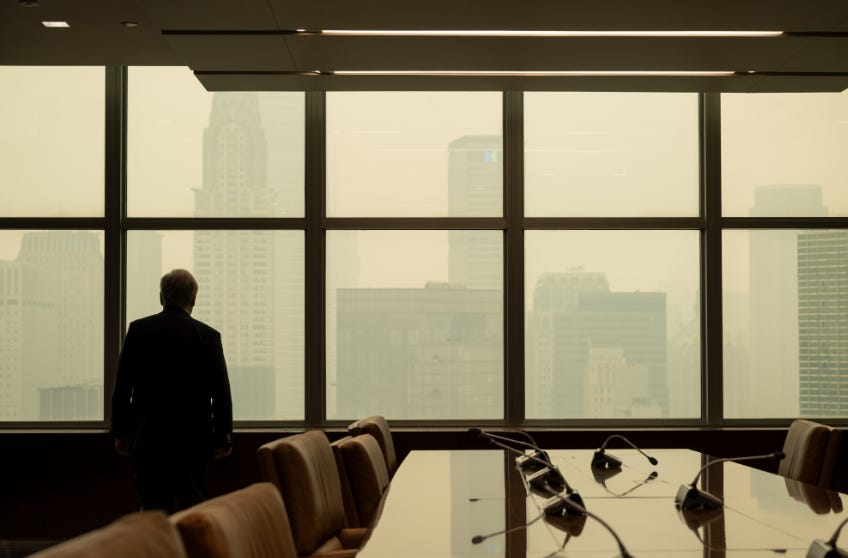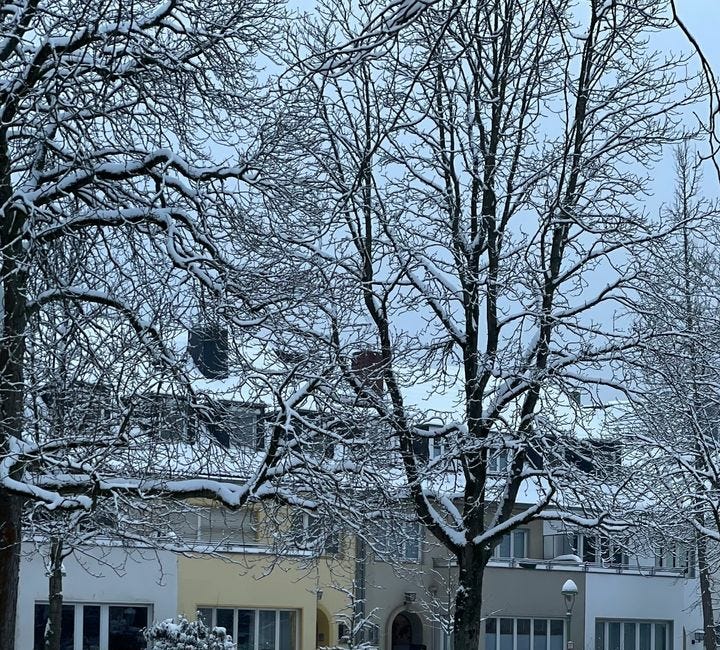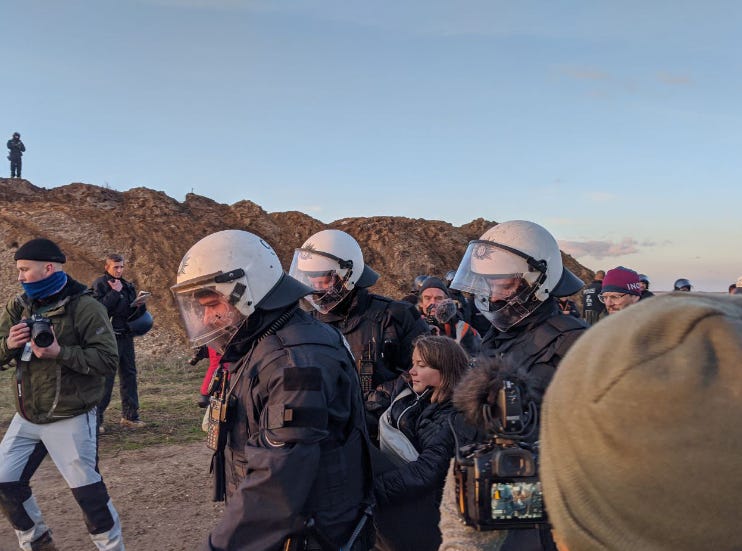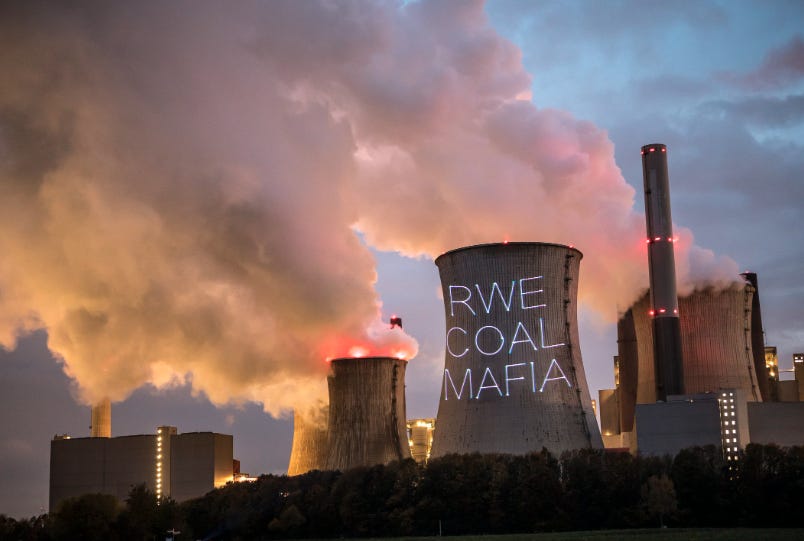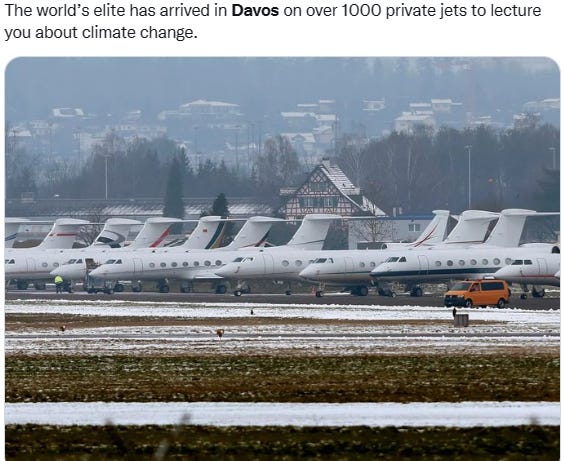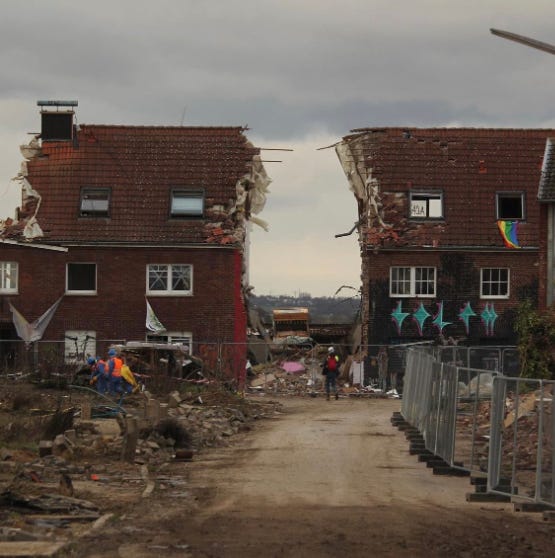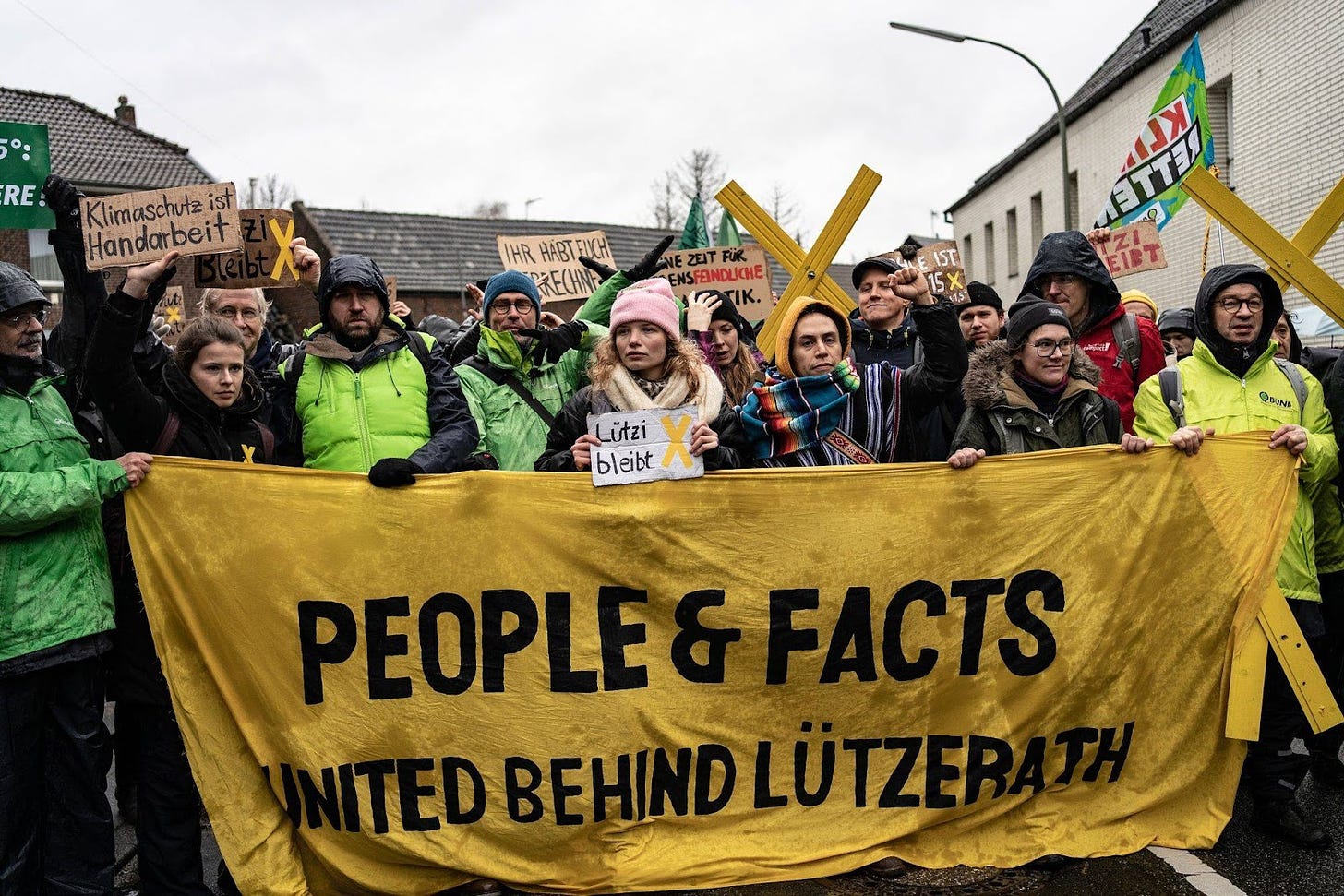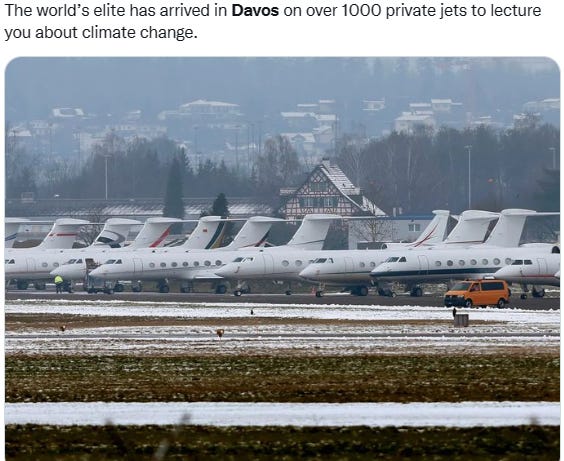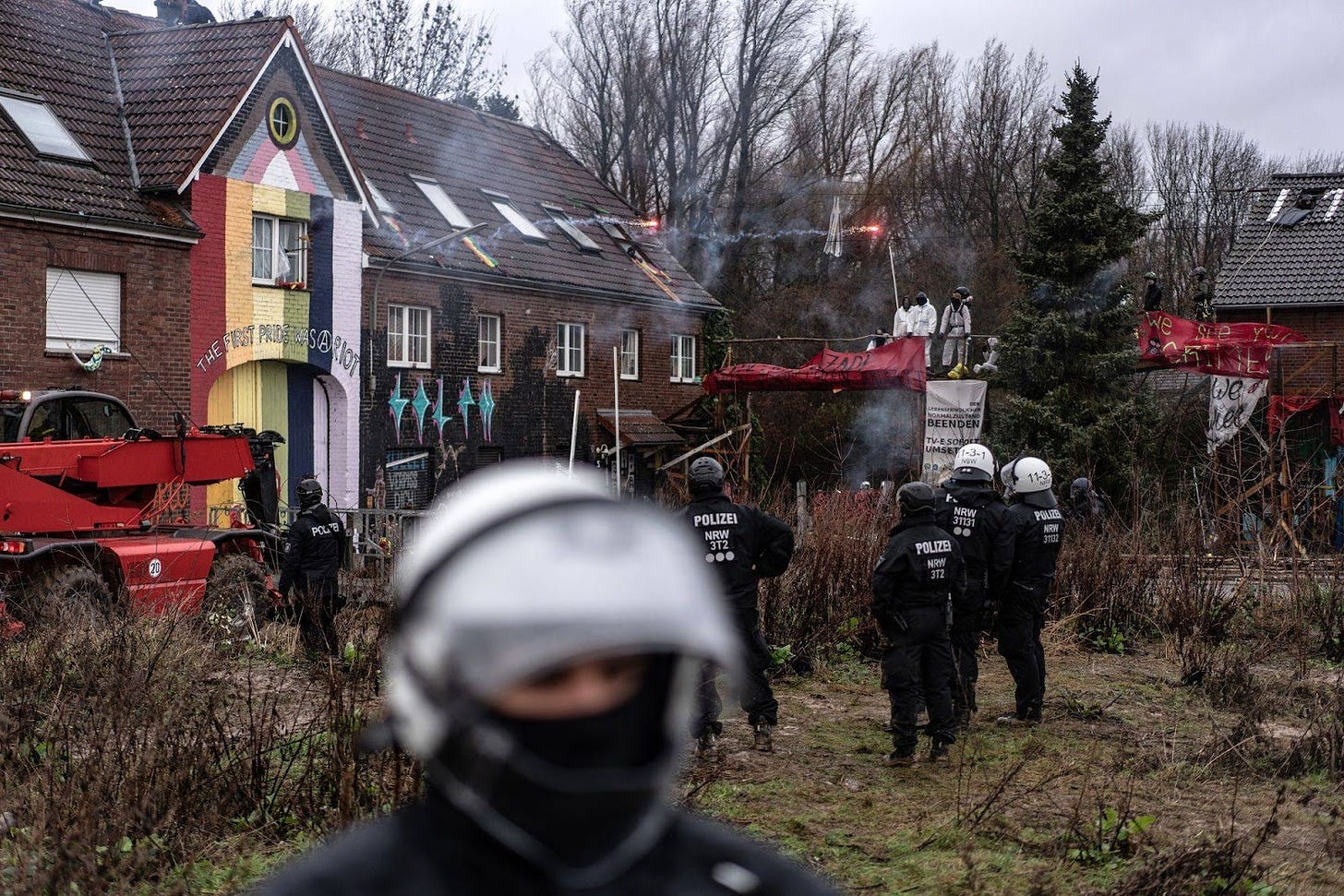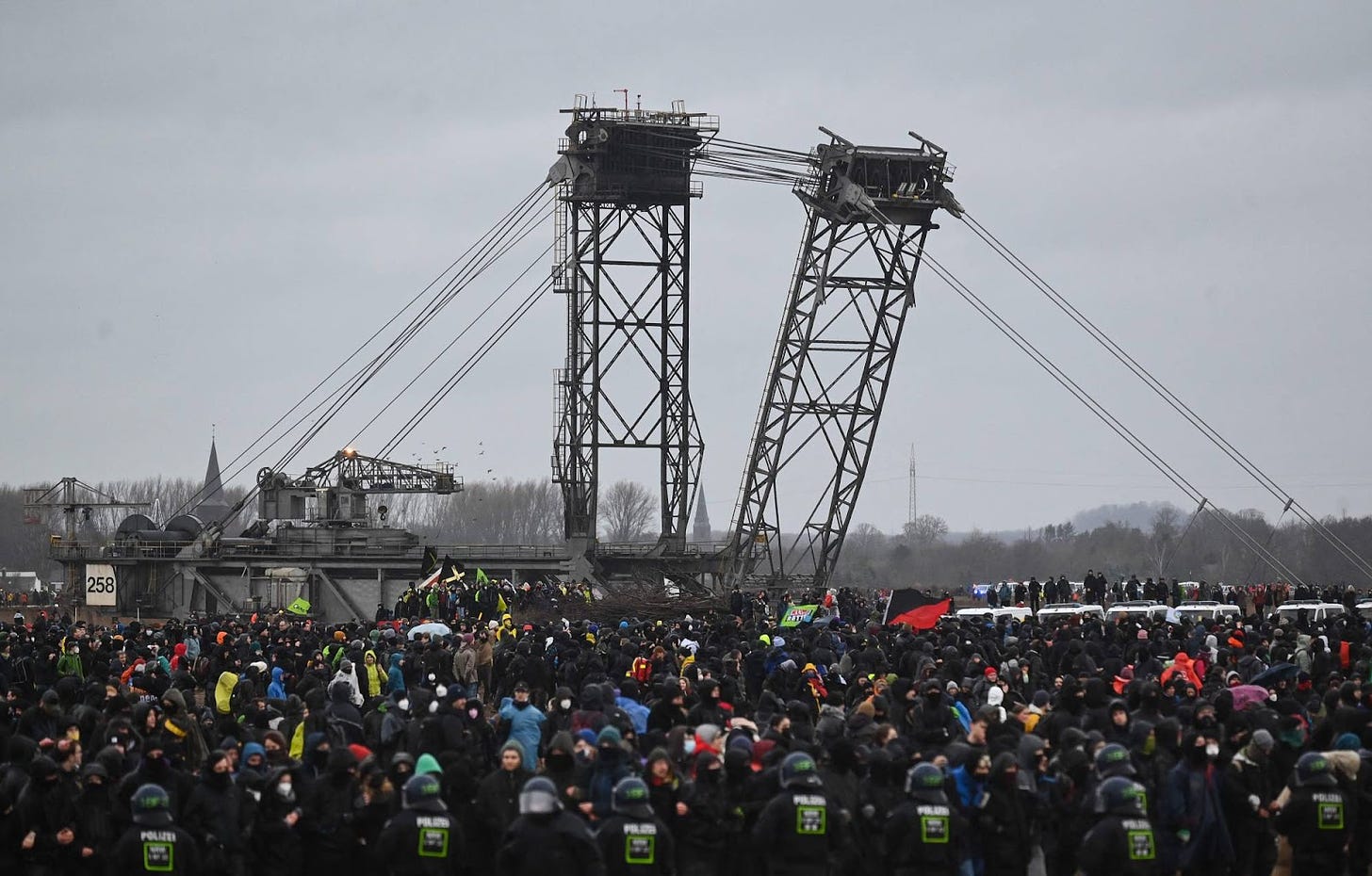Grüne Klimapolitik in Deutschland 2023
German police are facing accusations of excessive violence after they used batons to beat climate protesters in Lützerath, a village slated to be demolished to extend a coal mine. For years, activists tried to save the tiny German village of Lützerath from being razed to make way for the expansion of an open-pit coal mine. This past week, the police moved them out.
A 20 year old Greta Tintin Eleonora Ernman Thunberg (her birthday is Jan 3rd, shares the same date with Michael Schumacher – just 15 days ago). is unbothered as she’s detained by local Polizei (Police) in Germany following a protest over the expansion of a coal mine.
After all these years lecturing, even scolding, developing worlds of the importance of green energy, all the while the Europeans were addicted to buying gas from Russia, enabling and empowering Putin. a bunch of hypocrites.
Bundeskanzler Olaf Scholz two minutes ago. Klimaktivist.
Climate justice does not mean destroying nature - our life support system, peoples' livelihoods, or forcefully evicting defenders of Luetzerath to allow the expansion of a coal mine. Expanding the Garzweiler coal mine means more harm to our planet and people at the frontline. An estimated 9 million people die from pollution of all types each year, according to a new report. In comparison, COVID-19 killed about 6.7 million people globally since the pandemic began. SARS-CoV2 COVID-19 is more powerful than any green initiative to basically put a hard brake on greenhouse emission. It's nothing but amazing in how nature is protecting itself to ensure sustainability of life on earth.
From now on, if any caucasians, or European, or U.S., or Western, or especially Germans or any organization the german has alliance with lecturing asian about coal, climate change and all that any other bullshit, we're just gonna slap EVERY picture in Luetzerath to their face and tell them to go fuck their self. Thal St Gallen-Altenrhein Airport (ACH) (48.75 mi from Davos), Friedrichshafen Airport (FDH) (61.61 mi), Lugano Airport (LUG) (70.69 mi) or Zurich Airport (ZRH) (75.24 mi) currently full (these parking) with private jet(s), for high ranking guest World Economic Forum in Davos.
The protest started cheerfully enough on Wednesday, with music blaring and flags flying even under the driving rain. Then the police arrived, decked out in riot gear and backed by bulldozers, ready to demolish the village of Luetzerath to make way for the expansion of an opencast coal mine in the heart of Europe.
As Germany turns back to the dirtiest fossil fuel to counter a global energy crisis triggered by Russia’s invasion of Ukraine, this desolate settlement of drab brick houses and muddy fields has found itself at the center of a broader debate about the future of the continent’s energy security — and its consequences for a warming planet.
A few houses are all that remain of Luetzerath, a hamlet in Germany’s industrial powerhouse of North Rhine-Westphalia, where mining has deep roots and still provides thousands of jobs. Its original residents have long since been relocated, but as many as 300 activists moved in about two years ago to block a decades-old plan to expand mining operations in the area.
Resistance from climate protesters won a reprieve last year for five nearby villages that had also been slated for demolition, but dwindling supplies of natural gas from Russia have sealed the fate of Luetzerath, which traces its roots to the 12th century.
The entire settlement and adjoining land is now owned by German energy giant RWE, which has government approval to extract more lignite, a low quality form of brown coal that releases more planet-warming carbon dioxide when burned than any other.
German officials have said the revival of coal-burning is an emergency measure — needed to prevent electricity shortages and further price increases — while the government accelerates longer term investments in wind and solar power and secures substitute gas supplies from the Middle East. But images of police using water cannons and physical force against protesters as giant excavators grind into the landscape is a blow to Germany’s bid to portray itself as a climate leader. Environmental activists say returning to coal will set back Germany’s efforts to reach net zero carbon emissions by 2045 and meet its commitments under the Paris Agreement, which seeks to limit global warming to 1.5 degrees Celsius.
Another year of record heat, wildfires and drought across Europe, all exacerbated by climate change, has underscored the urgency even as the energy crisis sends governments scrambling to secure fossil fuel supplies.
Environmental activists stage a demonstration close to the village of Luetzerath, in Keyenberg, on Thursday. | Bloomberg
“For us, it’s a matter of showing that the violation of the Paris Agreement has a price,” said Luisa Neubauer, an activist at Fridays for Future, the youth-led climate movement founded in 2018 by Sweden’s Greta Thurnberg, who has lent her support to efforts to block Germany’s coal revival.
Across the globe, highly polluting — and relatively cheap — coal is making a comeback as governments seek to prevent soaring energy costs from upending economies and destabilizing governments already grappling with high inflation. The crisis is particularly acute in Europe, which has had to wean itself off Russian energy supplies since the invasion of Ukraine nearly a year ago.
Germany, the largest economy on the continent, relied on Russia for more than 50% of its gas supplies before the war and faces a more pressing crisis than its neighbors. Mild weather, a fast rollout of liquefied natural gas terminals and supplies from Norway have all worked in its favor, but the government still needs to lock in a bullet-proof solution for next winter and beyond.
It’s already reopened coal-fired power plants, despite plans to phase them out by 2038. But while other nations are bringing back limited capacity, Germany is restoring enough coal to power about 5 million homes, according to Bloomberg estimates. “Only in Germany, with 10 gigawatts, is the reversal at a significant scale,” according to the Paris-based International Energy Agency.
Germany now generates more than a third of its electricity from coal, according to Destatis, the federal statistics office. In December, it burned coal for electricity at the fastest pace in at least six years, data compiled by Bloomberg shows.
And while gas prices have declined recently, it’s still cheaper to burn the dirtier fossil fuel for power generation. “I think it was very wise to use more lignite during this winter and the next winter to deal with this really abrupt shortage of gas,” said Ingrid Nestle, a lawmaker for the Green party, which is part of the ruling coalition. “In the short run we need something to keep our systems stable. And this is what lignite is, but this doesn’t mean we are getting worse on the climate targets.”
The standoff over the mine expansion has dogged Germany’s Green party for decades and risks turning into a politically explosive issue as images of police forcibly removing protesters dominate social media. Economy and Climate Minister Robert Habeck is a member of the Green party and it was Green ministers who negotiated the latest agreement with RWE at both the federal and state level.
Plans to proceed with the Garzweiler II mine and allow lignite extraction to continue in Germany were originally approved in 1995 with broad cross-party support. The relocation of residents began in 2001, but pushback from climate activists has caused years of delays.
A compromise was finally reached in October last year that accelerates the phaseout of coal mining in western Germany by eight years and saves five other villages and three farms — home to 500 people — from demolition, but allows the excavation work in Luetzerath to go ahead.
Police prepare to enter buildings to remove environmental activists in the village of Luetzerath, on Thursday. | Bloomberg
Chancellor Olaf Scholz acknowledged that Germany needs to do more to shift to clean energy but said Luetzerath wasn’t the right battle.
“Perhaps the protest should be directed against the fact that it takes six years for a wind turbine to be approved,” he said in an interview published on Saturday with the Berlin-based Tageszeitung newspaper. “If we want to achieve the energy transition, we need more speed.”
Climate activists say their calculations show that more lignite mining is unnecessary and the energy crunch, which has seen electricity bills spike over the last year, is being exploited to justify a plan that mostly aims to save money. It will take two years to develop the lignite reserves that sit underneath Luetzerath, too late to provide any immediate relief from the Russian squeeze. And burning the 180 million metric tons the mine is expected to produce will reverse years of efforts to curb emissions, they argue.
“It’s just absurd to continue burning coal,” says Fabian Huebner, a senior campaigner at Europe Beyond Coal, a pressure group. “You can’t remediate the climate crisis and also the energy crisis with the fossil-nuclear electricity mix that got you into this mess.”
RWE is already the largest emitter in Europe with 89 million tons of direct emissions from its power stations, according to a March 2021 study commissioned by Greenpeace.
Burning coal at record speed saw Germany’s CO2 emissions stagnate last year even though energy consumption fell significantly and favorable weather lifted the share of wind and solar power to record levels, according to a study conducted by Agora Energiewende, a climate think tank.
At times in December, German electricity became as polluting as power produced in South Africa and India, exceeding 730 grams of carbon dioxide equivalent per kilowatt-hour, according to the Electricity Maps app.
Coal is not the only fuel that Germany is scrabbling to secure. While protests with prominent climate activists including Greta Thunberg took place Saturday, Scholz opened an LNG terminal more than 700 kilometers away in Lubmin to help substitute Russian flows.
Police face demonstrators during a large-scale protest to stop the demolition of the village Luetzerath to make way for an open-air coal mine extension on Saturday. | AFP-JIJI
Germany will need more gas-powered plants to secure electricity supplies in the coming decade, requiring an increase in LNG imports, a study of the network regulator BNetzA found. The country also plans to keep its three remaining nuclear plants online until mid-April, beyond their original retirement date. Germany agreed to phase out nuclear power in the aftermath of Japan’s Fukushima disaster in 2011, but Scholz’s government has come under mounting pressure to further extend that deadline.
His deputy Habeck’s Greens are ideologically opposed to nuclear power, putting them in conflict with more business-friendly partners in government. And they are increasingly struggling to explain how lignite is a better alternative.
Even some climate activists have said delaying the nuclear phaseout is preferable to delaying the coal phaseout if that’s the choice that must be made. Others say the Russian crisis should be seen as an opportunity to accelerate the shift to renewables, which aren’t hostage to geopolitics, but can also face resistance from environmentalists.
“The acceleration of renewables deployment is the linchpin for both achieving energy sovereignty in the middle of this decade and our 2030 climate targets,” said Fabian Hein, project manager for EU policy at Agora Energiewende.
But there are other political considerations at play. In 2022, Germany became, for the first time, a net exporter of power to France, which relies mostly on nuclear plants but is facing its own shortages. That’s made the dirtiest of fossil fuels a cheap and convenient fallback for Europe’s two heavyweights, bolstering RWE’s argument that lignite has repeatedly proved an essential component of the energy security mix. While the debate grinds on, police are slowly rooting out Luetzerath’s activists, whose last stand has prompted solidarity protests in other parts of Germany.
“We don’t have more time. We need to do something now,” said Max Goldkuhle, an activist who has lobbied for years for renewable energy. “We are not climate terrorists, we are people that are fighting for your future.”
==========
Die Landesregierung hat uns verprügeln lassen und uns den Ort genommen, an dem wir lebten und kämpften. Nur damit mehr Kohle gefördert werden kann, als für 1,5 Grad zulässig ist. Nur für RWE's Profit. Heute stoppen wir mit hunderten selbst den Tagebau. Lützerath ist überall. Keine Informationen über lebensgefährlich Verletzte in Kliniken – das sagen Aktivisten von luetzibleibt heute. Details zu einzelnen Verletzten wollen sie nicht herausgeben. Begründet wird das unter anderem mit möglichen „Repressionen“.
In #Lützerath hat die Regierung gezeigt, wie brutal sie fossile Interessen durchsetzt. Wir haben gezeigt, wie stark wir sind, wenn wir zusammenhalten. Der Weg bis zur Klimagerechtigkeit ist noch weit. Wenn wir hier gelernt haben, gemeinsam zu gehen, haben wir so viel gewonnen.
Ihr nehmt uns das Dorf, wir nehmen uns den Tagebau. Auch wenn die schwarz grüne Landesregierung uns und Greta wieder von der Polizei kesseln lässt, ist klar: #LuetzerathUnraeumbar denn hier geht es nicht nur um ein Dorf, sondern um globale Klimagerechtigkeit. "In was für einer Welt müssen sich Menschen im Tunnel verschanzen, um ihre Regierung zu hindern, die eigenen Abkommen zu brechen. Lützerath zu erhalten ist in jedem Moment möglich. Noch jetzt ist es möglich, dass die 280 Mio Tonnen Kohle hier im Boden bleiben." Indigo auf der PK. Die Bewohner eines Gebäudes in Lützerath versuchten, eine Genehmigung für eine Fotovoltaikanlage zu erhalten, die ihnen mit Verweis auf den Denkmalschutz verweigert wurde. Nun konnte RWE das ganze Gebäude trotz Denkmalschutz abreißen.
Lützerath ist geräumt, doch die Kohle darunter ist noch im Boden. Und so muss es auch bleiben, alles andere gefährdet unzählige Leben.




